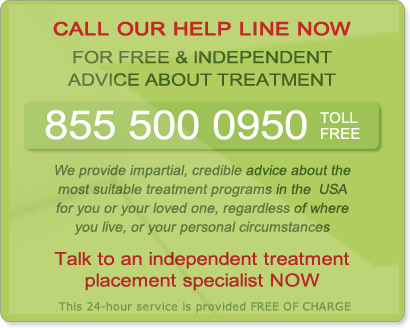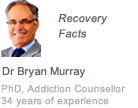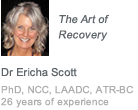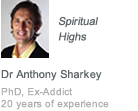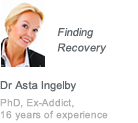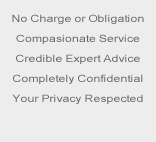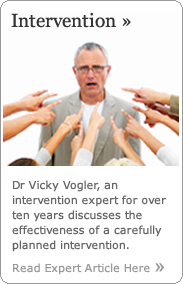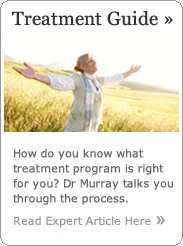Symptoms of Addiction
If I were to ask you the simple question: “Are you an addict?” how would you reply? If you genuinely are not an addict, you will probably say, “No, I am not an addict.” But then, if you are an addict, you are just as likely to say, “No, I am not an addict.”
Denial, you see, is one of the symptoms of addiction. It is a part of human nature. We do not wish to be viewed by others as being somehow weak or vulnerable, and so we try to persuade others –and ourselves- that there is no problem, that everything is fine. And if we are sufficiently convincing to ourselves and to others, then we are free to ignore the situation and be left alone to continue indulging the addiction. The problem is that denying or hiding an addiction allows some of the less pleasant physical and psychological symptoms of addiction to appear. Ignore these, and finally the hazardous and potentially life-threatening costs of addiction will not be far behind.
Denial of addiction
Denial is a mistake. Harboring an addiction does not automatically confer second-class citizenship upon you. It does not make you a criminal, or deny you the right to compassion and support. Addiction is an illness and, as with any illness, if you do not face up to the fact that you are suffering from it and seek professional treatment in order to help you recover, the consequences might eventually be fatal. Denial is one of the symptoms of addiction. If you rid yourself of the symptom of denial, you take the first step on the road to leaving behind all of the other, less desirable symptoms too.
So ask yourself that simple question. “Am I an addict?” And be honest with yourself. There is no need for shame or guilt. No-one will ever criticize you for being honest. If you feel unable to answer the question just yet, feel free to read on. Learning more about the symptoms of addiction may provide you with the knowledge needed to understand your situation and to take action to deal with it.
What are the symptoms of addiction?
The symptoms of addiction vary from person to person, and from addiction to addiction. But one thing that they all have in common, across the board, is the fact that you really are better off without them.
Elsewhere, we look at the signs of addiction. But we need to clarify how the signs differ from the symptoms of addiction. In brief, the signs of addiction are those physical or psychological clues that suggest to your friends, family and colleagues that something is wrong. Signs of addiction include mood swings, insomnia, pupil dilation and so on.
The symptoms of addiction are those changes in mental and physical wellbeing and behavior that are personal to the addict alone. The most commonly reported symptoms of addiction are:
- The subject of your addiction (drugs or alcohol for example) has become the sole focus of your life; your only considerations are when and where you will find your next fix.
- You have developed a tolerance to the subject of your addiction: you need ever-increasing amounts in order to maintain the desired level of intoxication.
- You experience withdrawal symptoms such as tremors, headaches, sleeplessness, nausea or paranoia if your access to the subject of your addiction is reduced or removed for any significant time.
- You continue to maintain your addiction even though you are fully aware that is causing you physical or mental harm, or hurting the people that know and care for you the most.
- You cannot stop, despite trying. The addiction has taken control to the extent that attempts to reduce or cut out usage by willpower alone are futile.
- You are prepared to go to any lengths, including criminal activity, in order to maintain your addiction.
- You make considerable efforts to conceal your addiction from friends and relatives, perhaps because you are ashamed or guilt-ridden and cannot face being judged by others.
What to do if you recognize the symptoms of addiction
If you recognize the symptoms of addiction in yourself or in someone you know and care for, it is vital that you seek professional help. Addiction is an illness that can be treated and recovered from. Addiction is not a lost cause, nor is it a reason for guilt, blame or shame.
If the symptoms of addiction are not recognized and addressed, the result may be a destructive cycle which harms employment prospects and personal relationships, invites financial hardship and possibly the need to resort to crime and which brings with it dangerous long-term physical and psychological damage.
It does not have to be like this. There is a world of professional assistance waiting for you. They will help you to get clean and to deal with the problems and pressures that brought you to addiction in the first place. They can give you the strategies you will need in order to cope with a return to normal life and help you to remain free from addiction.
You do not have to suffer alone. Friends, family, counselors and others who have been in the same situation are all out there. They know that you are not at fault, and that you are a human being with the same right to a happy and fulfilled life as anyone else.
By the way, do not make the same mistake again and confuse not being at fault as not being responsible – of course you are responsible, you made the choices that have led you to addiction – but that does not make you guilty of anything other than being an addict.
A better, happier future is in your hands. It could start today.
Ask yourself “Am I an addict?”
If you can answer yourself honestly, and the answer is ‘yes’, then I congratulate you. You have taken the biggest and most difficult step towards beating your addiction. You have crushed the symptom of addiction that is denial. You have courage. You are winning back control.
Now you can take the next, and far easier, second step. Get professional help, get clean and get your life back.


